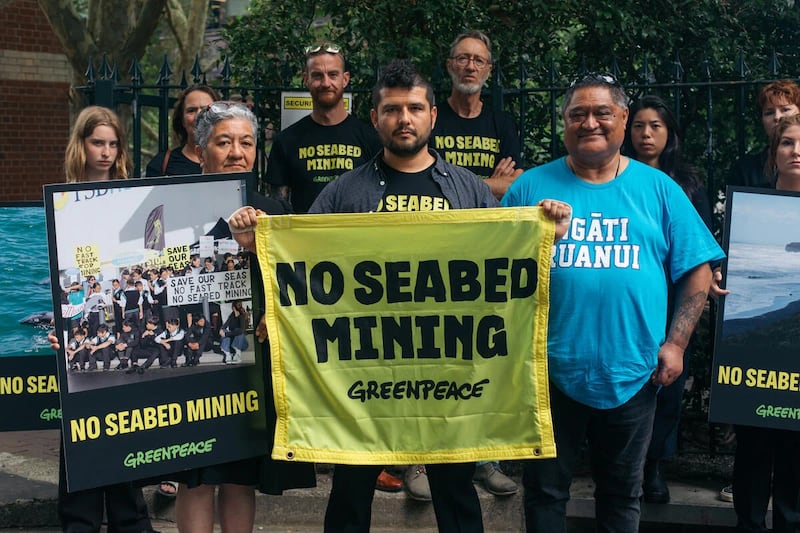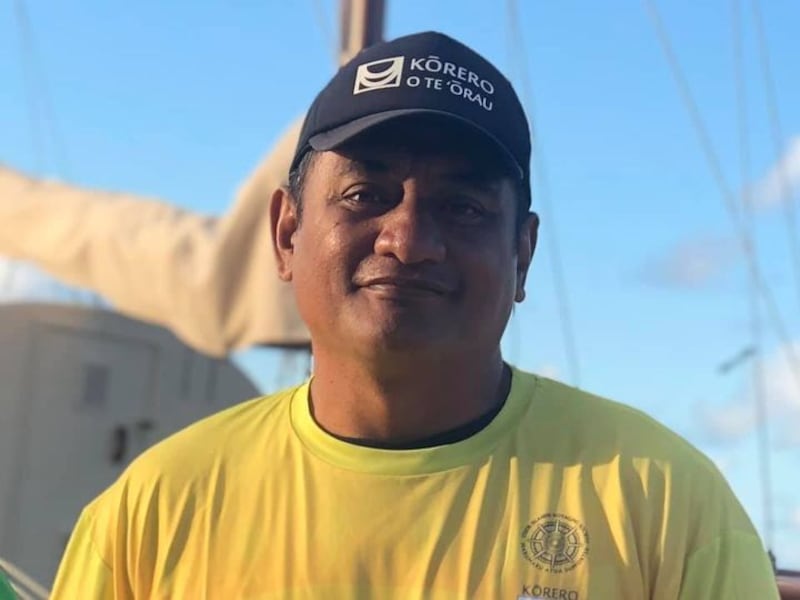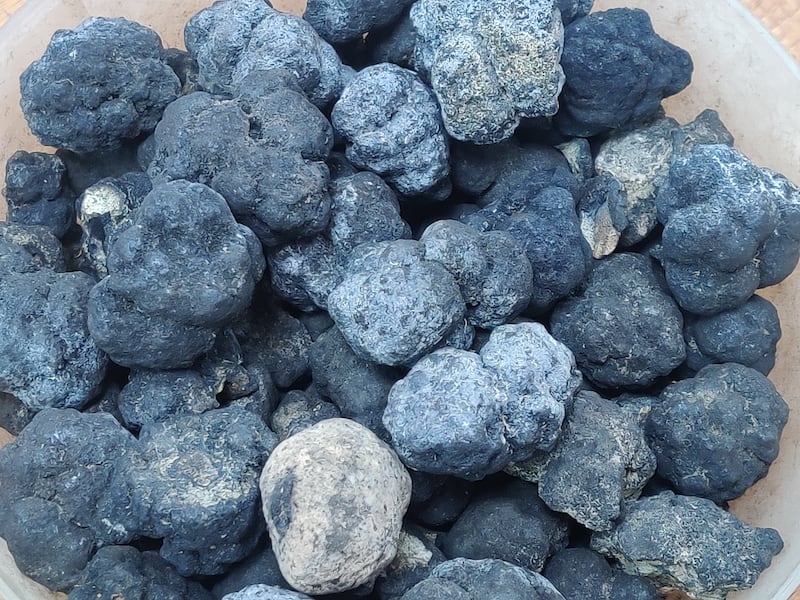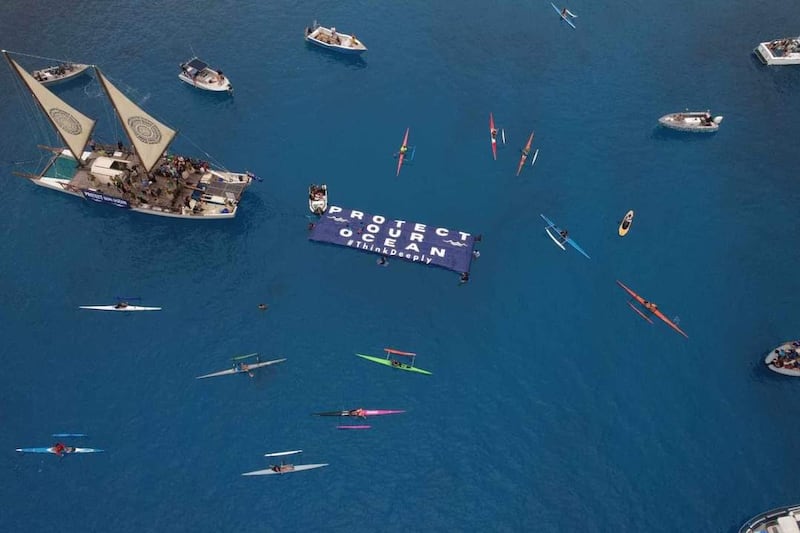This week, the Cook Islands came under scrutiny for excluding environmentalist groups from deep-sea mining consultations in Queensland, Australia.
Climate change is one of the greatest threats to Pacific nations, but an escalating military buildup and rising tensions between global superpowers have added another urgent danger.
Last month, Claire Slatter and Maureen Penjueli published a policy brief highlighting a critical shift in the justification for deep-sea mining, from sourcing minerals for the “green transition” to supplying metals for defence and national security.
“Clearly, the debate has now shifted from critical minerals for energy security to defence,” Penjueli said.

Science over ideology, but no scientific evidence
Recently, Cook Islands Prime Minister Mark Brown dismissed the perspectives of Te Ipukarea Society and Kōrero o te ‘Ōrau as ideological, claiming the government’s position was grounded in science. This mirrors statements by New Zealand MP Shane Jones, who defended seabed mining as science over emotion.
Greenpeace and others, however, argue that no credible scientific evidence has been presented to prove that seabed mining has a low environmental impact.
On the contrary, research shows that mined areas show no ecological recovery even after 50 years. Deep-sea mining risks long-lasting damage to biodiversity, sediment plumes that pollute marine ecosystems, and the destruction of the ocean’s role as a carbon sink.

Deep-sea mining is a false climate solution
In February, Te Ao Māori News spoke to Teina Rongo (Ngāti ‘Ūritaua) of Kōrero o te ‘Ōrau, who has been protesting deep-sea mining in Rarotonga. The protests followed news that the Cook Islands had made a debt-free deal with China, including seabed mining.
“The ocean is important to us as Indigenous people, and we already see that our ocean is facing a lot of threats.
“Climate change is a big one, and we can’t afford to put another stress on top of this,” says Rongo.
He added, “The narrative that is being used for the green transition, we feel that’s not the focus, the focus is national security, military communications, the development of weapons, and that does not align with our core values.”

He also expressed concern that if the critical minerals extracted by China are used for defence, it could jeopardise the Cook Islands’ national security and its relationship with New Zealand, a key ally of the United States.
The polymetallic nodules found on the seabed contain nickel, copper, cobalt, and manganese. These minerals were once framed as essential to produce electric vehicle batteries and therefore help meet Paris Agreement goals for the green transition away from fossil fuels. Since then, new battery chemistries have emerged that don’t rely on cobalt or nickel and use cheaper metals.
As a result, the green transition narrative is increasingly viewed as a false climate solution with environmental risks outweighing hypothetical benefits.
Victor Vescovo, venture capitalist and deep-sea explorer, echoed that the collapse of the green transition narrative has forced the mining industry to rebrand itself as essential for defence.

Militarisation and the legal grey zone
The US recently launched its first lease-sale evaluation for deep-sea mining in over 30 years near American Samoa, a territory that has already declared a moratorium on such activity.
Penjueli raised concerns about the US executive order issued under the outdated Deep Seabed Hard Mineral Resources Act (1980), bypassing international law and emphasising the need to secure defence supply chains.
Critical minerals are foundational to military supply chains for weapons and guidance systems, ammunition, communications, aircraft carriers, submarines, etc.
The US, however, is largely dependent on the import of these minerals as its mines have closed down due to environmental concerns, human rights, and workers’ rights.

China currently dominates the critical mineral supply chain, from mining to processing the minerals, and has a large stockpile. The move has sparked alarm over the militarisation of ocean spaces.
“UNCLOS is very clear around the peaceful use of the ocean and by extension the resources of the ocean,” she said.
She also linked these actions to global conflicts.
“If people understood that weapons and defence systems are then used on vulnerable populations, such as in Palestine and Gaza, the whole question of the heritage of the commons becomes critical. What does it mean when we are extracting minerals for war?”

Exploitation, vulnerability, and the need for alternatives in the Pacific
Many Pacific voices argue that their nations are being exploited under the guise of development.
“Historically, colonialism was extractive. Colonial forces came to the Pacific, mined resources, logged forests,” said Hēmi Hita, communications and advocacy coordinator for the Deep Sea Mining campaign.
“The only difference now is that instead of force, companies buy support through development.”
Penjueli added, “There’s enough research to demonstrate that countries in the Pacific, especially from the Global South, aren’t going to benefit [from deep-sea mining]."
Rongo also voiced concern about China’s growing development presence in the Cook Islands.
“They helped build our courthouse, one of our schools, and our sports complex. Even our water system. We do need assistance, but maybe New Zealand can step up so we don’t go to countries that don’t align with our values.”
Kainoa Azama of the Olohana Foundation called for more support, especially with USAID out of the picture, placing more economic pressure on Pacific Island countries.
“It’s not enough to tell them that they need to say no,” Azama said,
“We need to really support driving alternative economic futures that are regenerative, that don’t extract from our environment and cause such catastrophic harm.”



